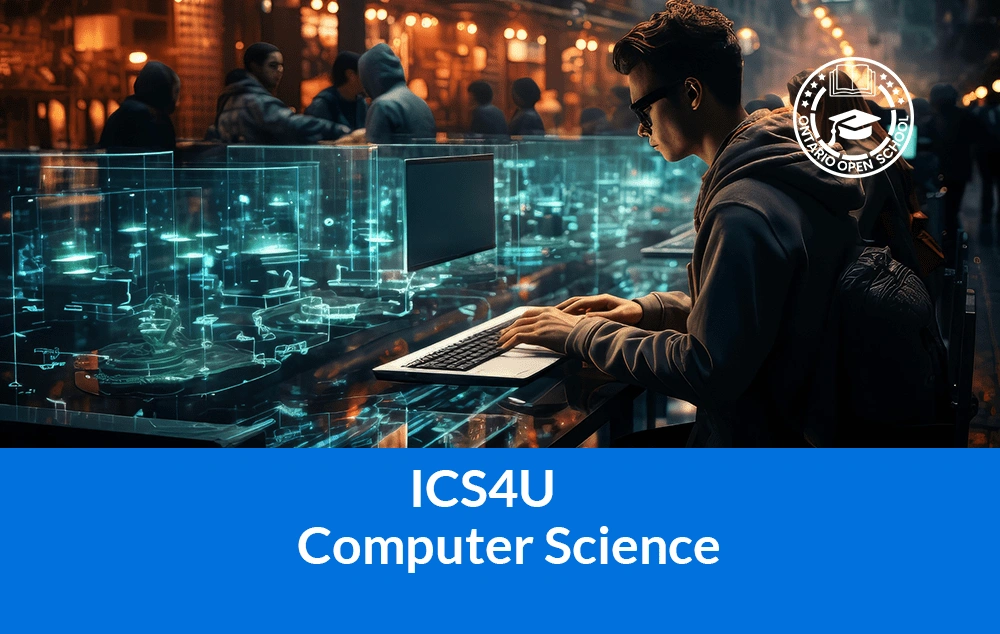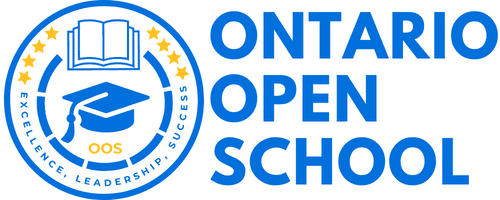- info@ontarioopenschool.com
- 647-494-4499
-
Unit 100 - 29 Gervais Drive, North York, ON.
M3C 1Y9
Copyright 2024 Ontario Open School Inc. All Rights Reserved.
This course enables students to further develop knowledge and skills in computer science. Students will use modular design principles to create complex and fully documented programs, according to industry standards. Student teams will manage a large software development project, from planning through to project review. Students will also analyse algorithms for effectiveness. They will investigate ethical issues in computing and further explore environmental issues, emerging technologies, areas of research in computer science, and careers in the field.
Unit Order | Unit Name | Suggested Time |
|---|---|---|
| Unit 1 | Programming Concept and Skills This unit is designed to review concepts taught in grade 11. It can also be used as a transition from the programming language taught in grade 11 to a new language in grade 12. It also includes a sub-unit on file I/O which may be taught late | 28 hours |
| Unit 2 | Software Development This unit is made up of three sub-units. Students will learn about and use algorithms involving 1D arrays, 2D arrays, searching, sorting and recursion. Assign a team project that will tie together the programming concepts and algorithms from previous units. Throughout this unit students will be taught software development concepts and demonstrate them as part of the project. There will be milestones set throughout the project where students will demonstrate growth and depth of learning regarding project design, and planning and management. The evaluation will take place at each milestone after students have had the opportunity to practice the skills taught and receive feedback. | 28 hours |
| Unit 3 | Designing Modular Programs in Unit 1 should now be enhanced as components within a modular programming framework. Teachers have the opportunity to introduce object-oriented concepts and an object-oriented programming language in this unit. | 23 hours |
| Unit 4 | Topics in Computer Science These topics can be covered using a variety of methods – through research assignments, group discussions or current programming projects | 21 hours |
| Final Evaluation 30% | Final Project Final Exam | 8 hours 2 hours |
| Total | 110 Hours |
A wide variety of instructional strategies are used to provide learning opportunities to accommodate a variety of learning styles, interests and ability levels. These strategies include, but are not limited to:
| Strategies marked with “X” are used in the course. | |||
| Direct Instruction (teacher-led) | X | Class Activity (teacher facilitation) | X |
| Direct Instruction (discussion possible) | X | Experiential learning (learn by doing) | X |
| Class Discussion (teacher facilitated) | X | Worksheets/Surveys | X |
| Small Group Discussion | X | Individual or Group Research | |
| Partner Discussion/Conferencing | X | Teacher modeling | X |
| 1:1 Conferencing Teacher & Student | X | Text-based modeling | |
| Teacher reading to class | Use of Computers / Internet | X | |
| Silent individual reading | Use of video tape or audio materials | ||
| Group based reading | Role Playing | ||
| Independent Work (teacher facilitation) | X | Presentations | X |
| Group Work (teacher facilitation) | X | Guest Speaker / Interviews / Questions | |
| Brainstorming | X | Field Trip | |
Purpose
The primary purpose of assessment is to improve student learning. Assessment relates directly to the expectations for the course.
A variety of assessments for and as learning are conducted on a regular basis to allow ample opportunities for students to improve and ultimately demonstrate their full range of learning and for the teacher to gather information to provide feedback. Assessment tasks relate to the success criteria set out in lesson plans. Success criteria allow students to see what quality looks like.
Evaluation is the process of judging the quality of student work in relation to the achievement chart categories and criteria and assigning a percentage grade to represent that quality. Evaluation is based on gathering evidence of student achievement through:
Assessment for Learning – we provide feedback and coaching. Assessment FOR Learning is the process of seeking and interpreting evidence for the use of learners and their teachers to decide where the learners are in their learning, where they need to go, and how best to go there.
Assessment as Learning – we help students monitor progress, set goals, reflect on their learning
Assessment AS Learning is the process of the explicit fostering of students’ capacity over time to be their own best assessors, but teachers need to start by presenting and modeling external, structured opportunities for students to assess themselves.
Assessment of Learning – we use assessments to provide evaluative statements about student achievement. Assessment OF Learning is the assessment that becomes public and results in statements of symbols
(marks/grades/levels of achievement) about how well students are learning. It often contributes to pivotal decisions that will affect students’ future.
ASSESSMENT TOOLS
| Assessment for Learning | Assessment as Learning | Assessment of Learning | |||
| Quizzes | Journal/Reflections | Tests | X | ||
| Tests | Exit and Entrance Cards | X | Presentations | X | |
| Presentations | X | KWL Chart | X | Journals | |
| Journals | Self/Peer assessment | Essays | X | ||
| Essays | X | Logs | Models | ||
| Models | Projects | X | |||
| Projects | X | Demonstrations | |||
| Demonstrations | Conferencing | ||||
| Conferencing | Questioning | ||||
| Questioning | Independent Study Assignment | X | |||
| Independent Study Assignment | Art Exhibits | ||||
| Art Exhibits | Researching | ||||
| Researching | Reading Aloud | ||||
| Reading Aloud | Problem Solving (process focused) | X | |||
| Problem Solving (process focused) | X | Debates | |||
| Debates | Work Sheets | ||||
| Work Sheets | X | Role Playing | |||
| Role Playing | Direct Instruction | ||||
| Direct Instruction | |||||
Resources
Grading
Weighting of categories
| Knowledge/Understanding | Thinking/Inquiry | Communication | Application |
| 25% | 25% | 25% | 25% |

Course Grade | Grade 12 |
|---|---|
Course Code | ICS4U |
Course Category | Computer Studies |
Course Type | University Preparation |
Course Delivery | Online |
Course Duration | 8hrs |
Course Credit | 0 |
Copyright 2024 Ontario Open School Inc. All Rights Reserved.
